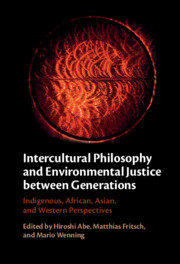 Intercultural Philosophy and Environmental Justice between Generations
Intercultural Philosophy and Environmental Justice between Generations A Mencian Proposal
from Part II - Intergenerational Ethics in Dialogue with Confucianism and Daoism
Published online by Cambridge University Press: 14 March 2024
This chapter advocates for a naturalistic ethical framework that bases normative components in basic human functions, such as emotions, as an effective approach to address intergenerational ethics questions. Using Mencius’s ethical framework as an example, which establishes emotional pivot points to incorporate others’ concerns and worries into moral deliberation, the chapter argues that this approach provides significant theoretical advantages over frameworks that rely on a familial-role-based relational understanding of Confucian ethics and moral cultivation through rituals. The chapter also highlights the flexibility and adaptability of Mencian ethics, which was redeveloped over a thousand years later during the Neo-Confucian flowering and serves as evidence of its philosophical framework’s ability to connect people emotionally and ethically across time.
To save this book to your Kindle, first ensure [email protected] is added to your Approved Personal Document E-mail List under your Personal Document Settings on the Manage Your Content and Devices page of your Amazon account. Then enter the ‘name’ part of your Kindle email address below. Find out more about saving to your Kindle.
Note you can select to save to either the @free.kindle.com or @kindle.com variations. ‘@free.kindle.com’ emails are free but can only be saved to your device when it is connected to wi-fi. ‘@kindle.com’ emails can be delivered even when you are not connected to wi-fi, but note that service fees apply.
Find out more about the Kindle Personal Document Service.
To save content items to your account, please confirm that you agree to abide by our usage policies. If this is the first time you use this feature, you will be asked to authorise Cambridge Core to connect with your account. Find out more about saving content to Dropbox.
To save content items to your account, please confirm that you agree to abide by our usage policies. If this is the first time you use this feature, you will be asked to authorise Cambridge Core to connect with your account. Find out more about saving content to Google Drive.